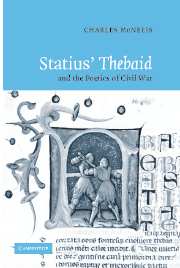Chapter 6 - End
Published online by Cambridge University Press: 22 September 2009
Summary
Jupiter's abdication just before the Thebaid's climactic duel precludes conventional forms of epic closure. After all, Zeus' role is paramount in resolving the tensions of the Iliad: he tells Thetis to convince Achilles to let go of his anger (Il. 24.104–19); he has Iris inform Priam that he should journey to Achilles' tent (Il. 24.144–58); and he then sends an eagle to encourage the old man to undertake the trip (Il. 24.314–15). In the Aeneid, too, Jupiter plays a central role in eliminating many of the problems that had been raised throughout the poem. He arranges for Juturna to forsake Turnus (Aen. 12.843–86), and most prominently, he convinces Juno to relent and to allow Aeneas' victory (Aen. 12.791–842). It is not surprising, then, that after Jupiter has quit the scene in the Thebaid, the final duel does not lead to resolution. To the contrary, Polynices indicates that the brothers' enmity remains and will continue even when they are in the underworld (Theb. 11.568–73).
While Statius discards the central role of the gods in resolving poetic narratives, he maintains other powerful closural features of Homeric and Virgilian epic. Statius follows Homeric practice, for instance, and continues to tell of events that take place in Thebes after the decisive conflict. In particular, Creon forbids the burial of Polynices' corpse and thereby replicates Achilles' refusal to bury Hector.
- Type
- Chapter
- Information
- Statius' Thebaid and the Poetics of Civil War , pp. 152 - 177Publisher: Cambridge University PressPrint publication year: 2007

